Thacker Surname Ancestry ResultsOur indexes 1000-1999 include entries for the spelling 'thacker'. In the period you have requested, we have the following 433 records (displaying 281 to 290): Single Surname Subscription | | | Buying all 433 results of this search individually would cost £2,466.00. But you can have free access to all 433 records for a year, to view, to save and print, for £100. Save £2,366.00. More... |
These sample scans are from the original record. You will get scans of the full pages or articles where the surname you searched for has been found. Your web browser may prevent the sample windows from opening; in this case please change your browser settings to allow pop-up windows from this site. British officers and civil servants in India
(1861)
The Indian Army and Civil Service List for July 1861 was printed by order of the Secretary of State for India in Council. Dating from after the reform of British rule in India in 1858, the one volume brings together lists of British military officers and civil officials. The regimental lists for the army in the three presidencies (Bengal, Madras and Bombay) are arranged as in any Army List of the period, giving officers by rank, with date of rank in the regiment and the army, and remarks. The native regiments had been reorganised and reduced from 174,237 of all ranks on 1 January 1859 to about 110,400 men in 1861. There are summary lists of all the native military, giving for each the names and dates of appointment of the British commandant, second-in-command, adjutant and medical charge - the Agra Levy, Alexander's Horse, Allahabad Levy, Allygurh Levy, Arracan Battalion, Assam Light Infantry, Bareilly Levy, Belooch Regiments, Benares Horse, Candeish Bheel Corps, Cawnpore Levy, Cutch Legion, Deolee Irregular Force, East Indian Regiment, Erinpoora Irregular Force, Extra Goorkha Regiment, Fane's Horse, Ferozepore Regiment, Futtehgurh Levy, Ghaut Police Corps, Guide Corps, Guzerat Bheel Corps, Guzerat Cooly Police Corps, Guzerat Irregular Horse, Guzerat Police Corps, Guzerat Provincial Battalion, Gwalior Camel Corps, Gwalior Infantry, Hazara Goorka Battalion, Hill Rangers, Hodson's Horse, Hyderabad Contingent, Jacob's Rifles, Kamroop Regiment, Kemaoon Battalion, Kemaoon Levy, Khelat-i-Ghilzie Regiment, Kolapore Infantry, Lahore Horse, Lucknow Regiment, Loodianah Regiment, Mahratta Horse, Malwa Bheel Corps, Meade's Horse, Meerut Levy, Meywar Bheel Corps, Mhair Regiment, Mhairwarrah Battalion, Mooltanee Cavalry, Moradabad Levy, Murray's Jhat Horse, Mynpoorie Levy, Nagpore Irregular Force, Nusseree Battalion, Patan Cavalry, Pegu Light Infantry Battalion, Ramgurh Irregular Cavalry, Poona Horse, Poorbeah Regiment, Punjab Cavalry, Punjab Infantry, Punjab Irregulars, Robarts's Horse, Rohilcund Horse, Rutnagherry Rangers, Sattara Local Corps, Sawunt Waree Local Corps, Scinde Horse, Sebundy Sappers and Miners, Seikh Infantry, Seikh Irregulars, Shahjehanpore Levy, Shekhawatee Battalion, Sirmoor Rifles, and Sylhet Light Infantry. European civil servants are listed from the Accountant-General's Office, Audit Department, Civil Service, Government Offices, Judge Advocate-General's Department, Public Works Departments and Surveyor-General's Department; and there are clergy, law and medical lists. THACKER. Cost: £4.00.  | Sample scan, click to enlarge
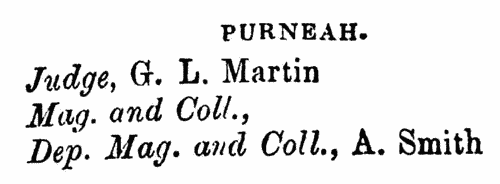
| Long-stay Paupers in Workhouses: Ashbourne
(1861)
This comprehensive return by the Poor Law Board for England and Wales in July 1861 revealed that of the 67,800 paupers aged 16 or over, exclusive of vagrants, then in the Board's workhouses, 14,216 (6,569 men, 7,647 women) had been inmates for a continuous period of five years and upwards. The return lists all these long-stay inmates from each of the 626 workhouses that had been existence for five years and more, giving full name; the amount of time that each had been in the workhouse (years and months); the reason assigned why the pauper in each case was unable to sustain himself or herself; and whether or not the pauper had been brought up in a district or workhouse school (very few had). The commonest reasons given for this long stay in the workhouse were: old age and infirm (3,331); infirm (2,565); idiot (1,565); weak mind (1,026); imbecile (997); and illness (493). THACKER. Cost: £6.00.  | Sample scan, click to enlarge

| Residents and Traders in Birmingham
(1861)
William Cornish's Corporation General and Trades Directory covered Birmingham, Coventry and the towns of the Black Country. The Birmingham section contains both street lists and this general alphabetical directory. THACKER. Cost: £4.00.  | Sample scan, click to enlarge
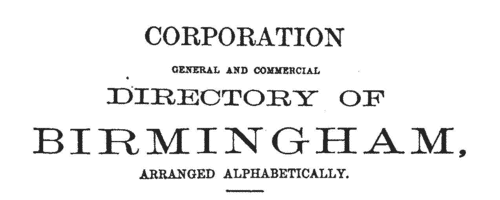
| Boys entering Wellington College in Berkshire
(1863)
Wellington College, near Wokingham, was originally founded for the education of sons of military officers. A register of boys entering the school from First Term 1859 to Michaelmas 1933 was compiled by F. G. Lawrence for the Old Wellingtonian Society. In each entry the boy's name is given in full, in bold, surname first; age at entry (usually 11 to 14); then, in brackets, the name of the dormitory or house to which he belonged, in italics, with the years of his stay; then his father's name (usually surname and initials, but not christian name) with military decorations where appropriate. School prefects and captains are noted as such; if the boy played cricket for the school, XI with the years; academic honours, scholarships, &c.; a brief biography; and date of death, or (where known) address in 1933. Year of marriage is given, and sometimes the wife's name and/or her father's name. Clearly, those boys who kept contact with the school and/or had distinguished military careers have detailed entries; others disappeared into oblivion on leaving.THACKER. Cost: £6.00.  | Sample scan, click to enlarge
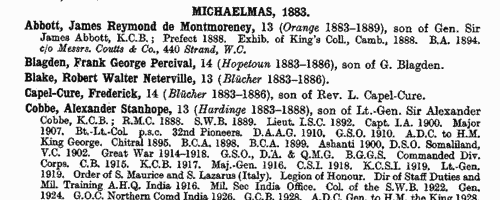
| Dublin Electors
(1865)
This alphabetical list of electors for the City of Dublin for 1865 is annotated with details of the votes cast in the election of 15 July 1865 for a member of Parliament. The candidates were John Vance, Esq., D. L. (V), Benjamin Lee Guinness, Esq., D. L., LL. D. (G), and Jonathan Pim, Esq. (P). The first column gives, in bold, the initial of the ward in which lay the property that was the elector's qualification. The second column gives the elector's sequential number (alphabetically) within that ward. Then the elector's full name is given, surname first, and address, usually including house number. The votes cast are shown on the right: where these columns are blank, the elector did not vote. The key to the ward names is: A, South Dock; B, Donnybrook; C, Rathdown; D, Trinity; E, South City; F, Royal Exchange; G, Mansion House; H, Fitzwilliam; I, Wood Quay; K, Merchants' Quay; L, Usher's Quay; M, Arran Quay; N, Inns' Quay; O, North City; P, Rotundo; Q, Mountjoy; R; North Dock. S indicates the register of freemen.THACKER. Cost: £4.00.  | Sample scan, click to enlarge
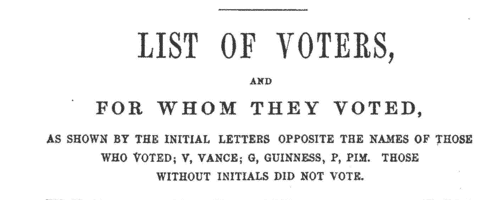
| Unclaimed Money and Property
(1866)
Gun & Co. of 17 Charlotte Street, and later of 6 Prince of Wales' Road, London, in about 1866 published this second 'List of Next of Kin & Heirs, &c., who have been Advertised for in the English, Irish, Scotch, United States of America, Canadian, Australian, East and West Indian, and other Newspapers, since 1704. Money & Property to the value of many Millions Sterling want Claimants'. The list of 4,128 names gives surname, christian name, and, occasionally, locality. Copies of the actual advertisements were furnished to enquirers by the company at a cost of six shillings. THACKER. Cost: £4.00.  | Sample scan, click to enlarge

| Patentees of New Inventions
(1867)
Abstracts of British patents for new inventions applied for and granted from 1 January to 31 December 1867: giving date, name and address, and short description of the invention. It is then stated whether 'Letters patent sealed' or 'Provisional protection only'.THACKER. Cost: £6.00.  | Sample scan, click to enlarge

| Dublin University Electors
(1868)
The roll of all persons entitled to vote at elections for members to serve in Parliament for the University of Dublin lists living graduates of the university, arranged alphabetically by surname and christian name(s), with current residence, dates at which their degrees were conferred - Vern. denoting the Spring, Aest. the Summer, and Hiem. the Winter Commencements - and date of registration. Members of the Senate and electors on the books of Trinity College are distinguished by a dagger. Where an elector's name is given in italics, he was no longer known at the residence given.THACKER. Cost: £4.00.  | Sample scan, click to enlarge

| Electors for Leamington Priors
(1868)
A poll for the election of two knights of the shire to represent South Warwickshire was held 24 November 1868: the candidates were Lord Hyde (H.), Sir R. N. C. Hamilton (H.), H. C. Wise, Esq. (W.) and John Hardy, Esq. (H.). This poll book lists all those electors who voted; the county franchise included not only male freeholders of 40s a year, but also £10 copyholders and long-leaseholders, and £50 short-leaseholders and tenants. In addition, where no vote was cast the elector's number and name are given, the name in italics. The names are arranged by polling district and then by parish or township. Freeholders holding requisite property in a district are listed there, but might well reside elsewhere. The right-hand column indicates how each man voted. THACKER. Cost: £4.00.  | Sample scan, click to enlarge
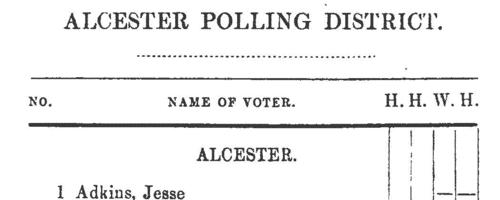
| Electors for Southam
(1868)
A poll for the election of two knights of the shire to represent South Warwickshire was held 24 November 1868: the candidates were Lord Hyde (H.), Sir R. N. C. Hamilton (H.), H. C. Wise, Esq. (W.) and John Hardy, Esq. (H.). This poll book lists all those electors who voted; the county franchise included not only male freeholders of 40s a year, but also £10 copyholders and long-leaseholders, and £50 short-leaseholders and tenants. In addition, where no vote was cast the elector's number and name are given, the name in italics. The names are arranged by polling district and then by parish or township. Freeholders holding requisite property in a district are listed there, but might well reside elsewhere. The right-hand column indicates how each man voted. THACKER. Cost: £4.00.  | Sample scan, click to enlarge
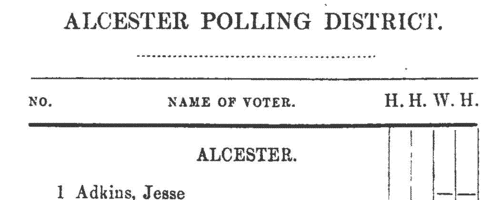
|
Research your ancestry, family history, genealogy and one-name study by direct access to original records and archives indexed by surname.
|












